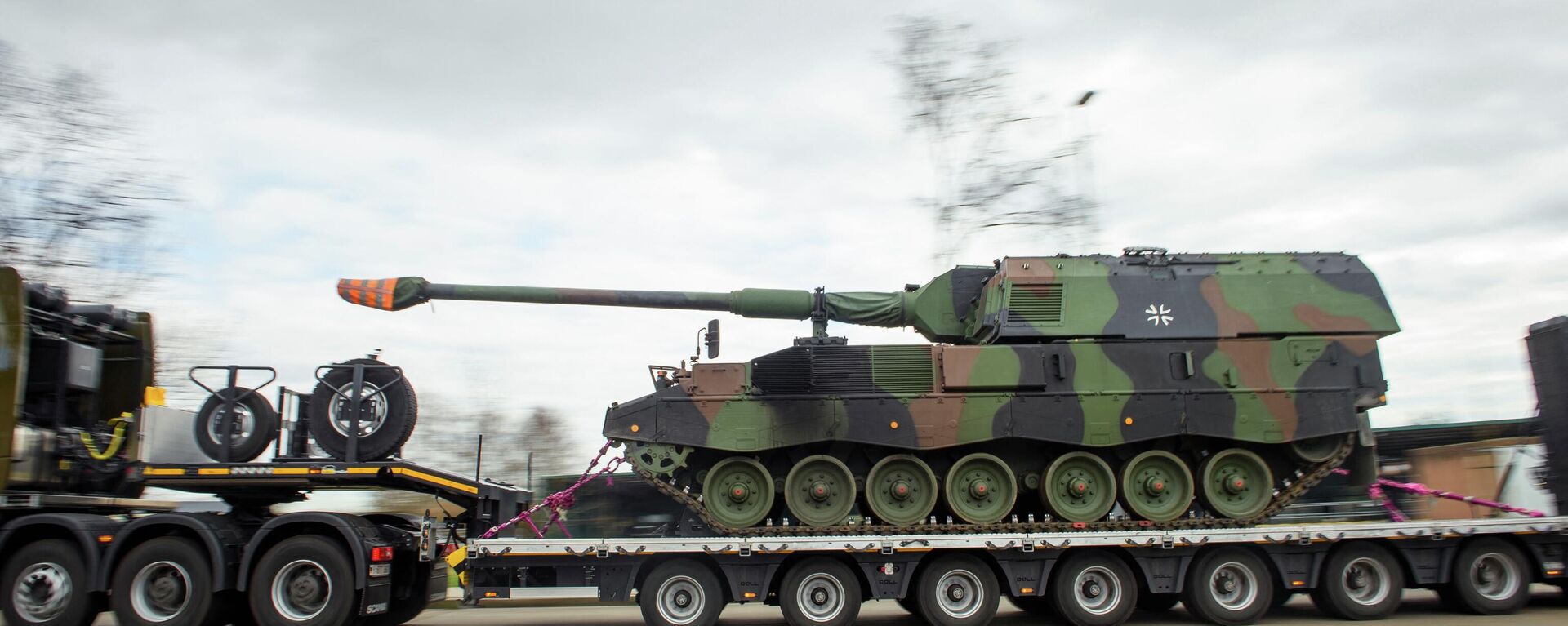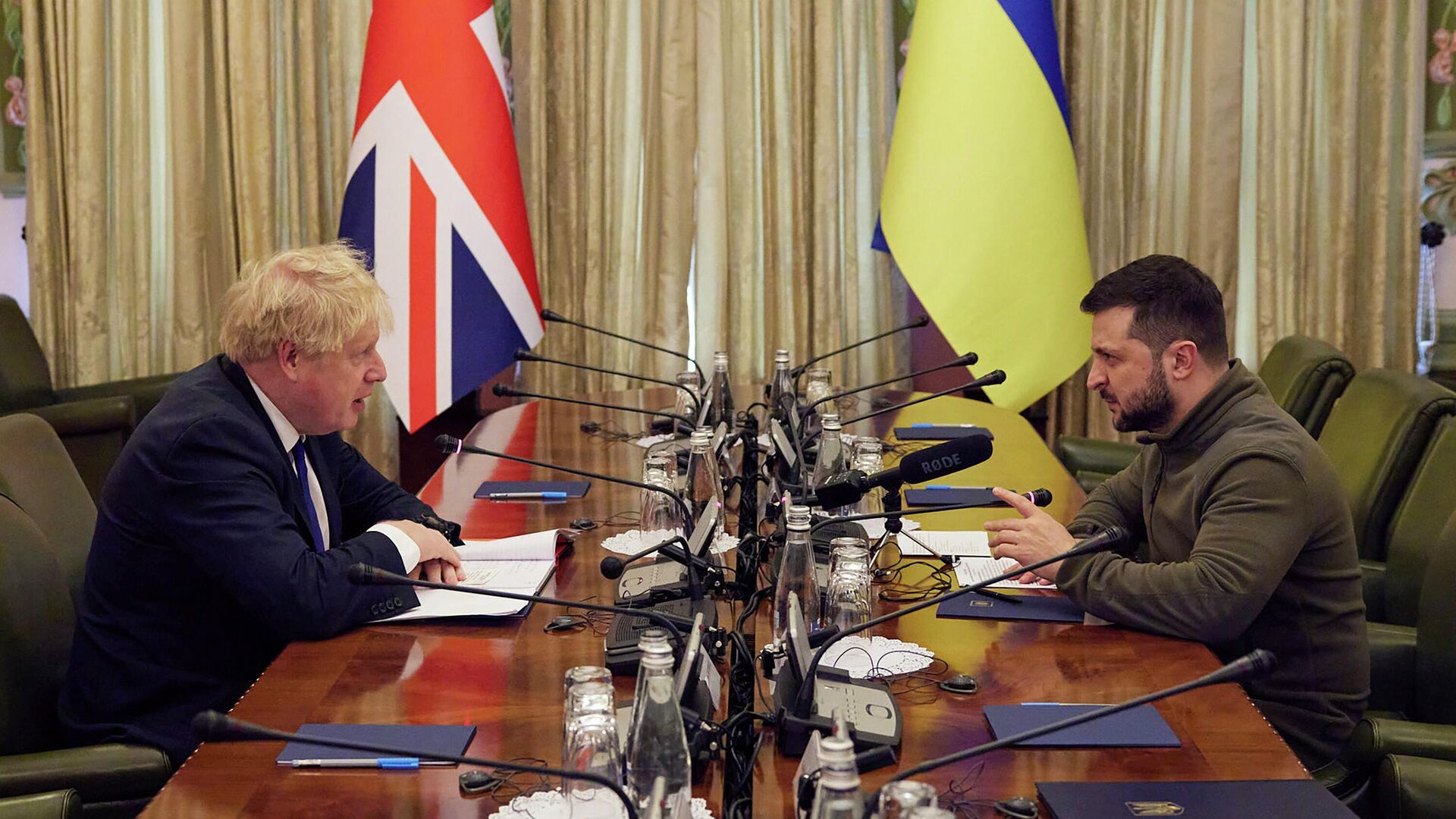https://sputnikglobe.com/20220828/uk-to-reportedly-run-out-of-arms-and-funds-for-ukraine-by-end-of-2022-1100093519.html
UK to Reportedly Run Out of Arms and Funds for Ukraine by End of 2022
UK to Reportedly Run Out of Arms and Funds for Ukraine by End of 2022
Sputnik International
Whoever the incoming prime minister might be, they face a tough choice between stopping to help Kiev or drawing more from the already stressed budget amid... 28.08.2022, Sputnik International
2022-08-28T17:11+0000
2022-08-28T17:11+0000
2023-05-28T15:20+0000
russia's special operation in ukraine
crisis
weapons
ukraine
united kingdom (uk)
https://cdn1.img.sputnikglobe.com/img/07e6/08/1c/1100093373_0:277:3001:1965_1920x0_80_0_0_d740d1f7519abbc327c1861db6860153.jpg
The UK is running out of weapons to send to Ukraine and won't be able to provide financial assistance for Kiev's military needs by the end of 2022, The Times reported citing an anonymous Ministry of Defense source.While the conflict in Ukraine does not show signs of coming to an end, Whitehall policy planners have been forced to admit that they are "on this train now, and there is no getting off," the newspaper's sources claimed. This situation threatens to put the new prime minister, whoever will take the seat after the Tory leadership election, into a tough spot, The Times noted.According to vice-chairman of the Royal United Services Institute and Britain’s former national security adviser, Lord Ricketts, London found itself in this situation because it was convinced it was making the right call by pledging help to Ukraine and not considering the long-term implications.He pointed out that there is a "fairly shallow national consensus" that the UK was right to back Ukraine at the onset of the Russian special military operation, but no-one cared to ask the question whether the country can weather the events that may follow.At the same time, ordinary Brits, who in February and March were galvanized to offer help to Ukrainian refugees and eagerly supported British sanctions against Russia, are starting to feel the pinch of their actions, resulting in what the newspaper called "Ukraine fatigue".One of their greatest concerns is the price of gas and electricity. National regulator Ofgom announced earlier this week an 80% rise in the energy price cap, a limit on a price of a unit of gas and electricity. This followed a similar raise in April.While some Brits asked by the newspaper said that they believed that they must suffer and endure the economic woes brought about by the western support of Ukraine and anti-Russian sanctions, others feared that support for Kiev might have gone too far.Public opinion polls in the UK also show a reduction in support of western anti-Russian pressure. At the onset of the Russian special military operation, a YouGov poll showed that 48% of Brits backed the idea of anti-Russian sanctions even if they led to higher energy bills, while 38% opposed the move. Now, only 38% support them, while the majority believes it's not worth the consequences.The UK is second only to the US in funds spent on sending weaponry to Ukraine with $4.37 billion allocated for this purpose. All the while, its citizens await a government measure to contain the severe surge in energy prices. UK Prime Minister Boris Johnson has routinely visited Kiev and met with Ukrainian President Volodymyr Zelensky, and frequently promises to send more weapons.Russia has repeatedly condemned the West’s practice, pointing out that it emboldens Kiev to ignore the diplomatic paths to resolving the conflict. Since weapons started to arrive in Ukraine, Kiev halted negotiations with Russia and its officials started to claim that they will only end hostilities when Russian forces are expelled from parts of Ukraine, Donbass and Crimea.
https://sputnikglobe.com/20220828/german-foreign-minister-says-berlin-wants-to-help-ukraine-but-is-out-of-weapons--1100090045.html
ukraine
united kingdom (uk)
Sputnik International
feedback@sputniknews.com
+74956456601
MIA „Rosiya Segodnya“
2022
Sputnik International
feedback@sputniknews.com
+74956456601
MIA „Rosiya Segodnya“
News
en_EN
Sputnik International
feedback@sputniknews.com
+74956456601
MIA „Rosiya Segodnya“
Sputnik International
feedback@sputniknews.com
+74956456601
MIA „Rosiya Segodnya“
crisis, weapons, ukraine, united kingdom (uk)
crisis, weapons, ukraine, united kingdom (uk)
UK to Reportedly Run Out of Arms and Funds for Ukraine by End of 2022
17:11 GMT 28.08.2022 (Updated: 15:20 GMT 28.05.2023) Whoever the incoming prime minister might be, they face a tough choice between stopping to help Kiev or drawing more from the already stressed budget amid Brits' financial woes, The Times said citing anonymous sources.
The UK is running out of weapons to send to Ukraine and won't be able to provide financial assistance for
Kiev's military needs by the end of 2022, The Times reported citing an anonymous Ministry of Defense source.
While the conflict in Ukraine does not show
signs of coming to an end, Whitehall policy planners have been forced to admit that they are "on this train now, and there is no getting off," the newspaper's sources claimed. This situation threatens to put the new prime minister, whoever will take the seat after the Tory leadership election, into a tough spot, The Times noted.
"The new prime minister will very soon face the question of whether to commit billions of pounds of additional support at a time when the public finances are under intense strain,” it highlighted.
According to vice-chairman of the Royal United Services Institute and Britain’s former national security adviser, Lord Ricketts, London found itself in this situation because it was convinced it was making the right call by
pledging help to Ukraine and not considering the long-term implications.
He pointed out that there is a "fairly shallow national consensus" that the UK was right to back Ukraine at the onset of the Russian special military operation, but no-one cared to ask the question whether the country can weather the events that may follow.
"This isn’t likely to end in some kind of 1945-style defeat for Putin and Russia. There’s no way out apart from building up the Ukrainians militarily and hoping something turns up. There’s no real-term long-term thinking about where we are heading. Can it go on indefinitely? Where do we see this coming out?" Lord Ricketts wondered.
At the same time, ordinary Brits, who in February and March were galvanized to offer help to Ukrainian refugees and eagerly supported British sanctions against Russia, are starting to feel the pinch of their actions, resulting in what the newspaper called "Ukraine fatigue".
One of their greatest concerns is the price of gas and electricity. National regulator Ofgom announced earlier this week an 80% rise in the energy price cap, a limit on a price of a unit of gas and electricity. This followed a similar raise in April.
While some Brits asked by the newspaper said that they believed that they must suffer and endure the economic woes brought about by the western support of Ukraine and anti-Russian sanctions, others feared that support for Kiev might have gone too far.
"I do support arming Ukraine but I’m absolutely bloody terrified by the price of gas […] I do think we’ve been a little guilty of overly glorifying the Ukrainians," 59-year-old medical practice manager Karine Hyde told The Times.
Public opinion polls in the UK also show a reduction in support of western anti-Russian pressure. At the onset of the Russian special military operation, a YouGov poll showed that 48% of Brits backed the idea of anti-Russian sanctions even if they led to higher energy bills, while 38% opposed the move. Now, only 38% support them, while the majority believes it's not worth the consequences.
The UK is second only to the US in funds spent on sending weaponry to Ukraine with $4.37 billion allocated for this purpose. All the while, its citizens await a government measure to contain the severe surge in energy prices. UK Prime Minister Boris Johnson has routinely visited Kiev and met with Ukrainian President Volodymyr Zelensky, and frequently promises to send more weapons.

28 August 2022, 14:08 GMT
Russia has repeatedly condemned the West’s practice, pointing out that it
emboldens Kiev to ignore the diplomatic paths to resolving the conflict. Since weapons started to arrive in Ukraine, Kiev halted negotiations with Russia and its officials started to claim that they will only end hostilities when Russian forces are expelled from parts of Ukraine, Donbass and Crimea.





